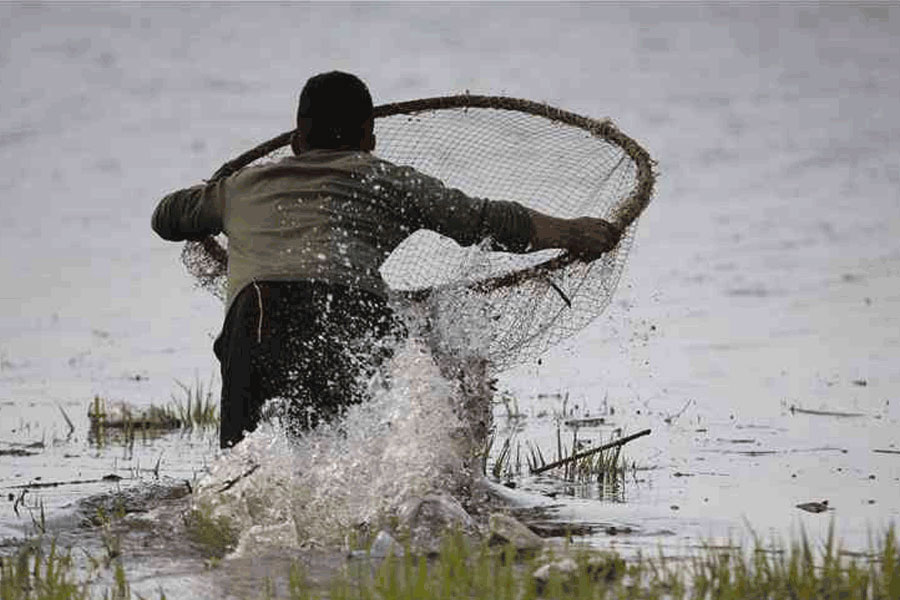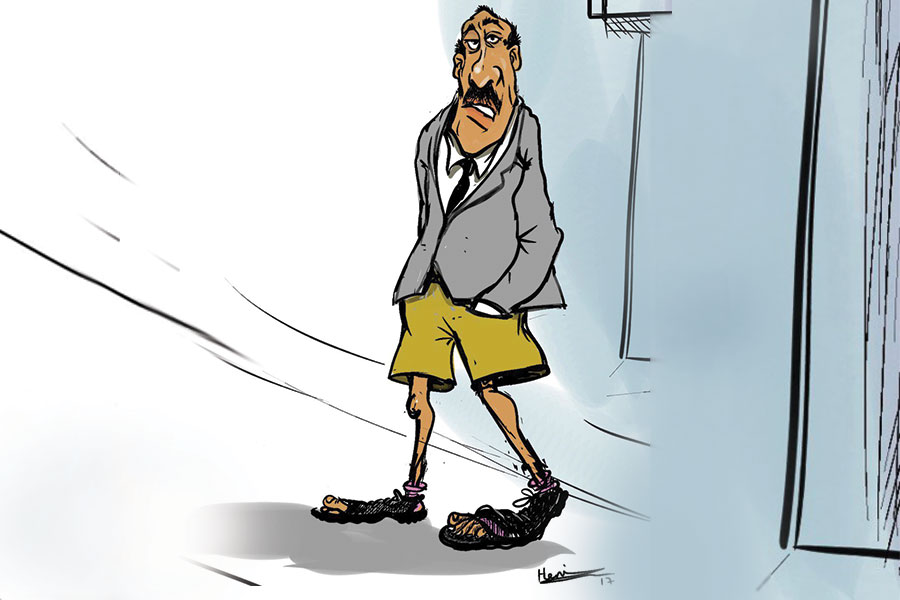
Fortune News | Oct 27,2024
Matrimony is never a dull affair in Ethiopia. Contesting "My Big Fat Greek Wedding", it is noisy, elaborate, extensive, expensive and joyous. Come wedding season, and the streets are bustling with long convoys, honking horns and flashing their turn signals.
Hana Berhanu, 30, envisioned such a wedding since her youth. She had been planning a picture-perfect wedding after graduating in electrical engineering from the Addis Abeba University and landing a job a decade ago. Over the past five years, Hana and her fiancé Alemayehu Gebremichael, now husband, had been saving for their big day. He works as a branch manager for a commercial bank.
Hana, the firstborn in her family, was keen to tie the knot. Her wedding was scheduled for a day at the end of 2020. Little did she know what had lay ahead. A Japanese citizen who had travelled to Ethiopia from West Africa tested positive for COVID-19 in March of that year. Restrictions on large gatherings, mandatory social distancing and face coverings quickly followed.
Hana and her fiancé had to defer their wedding. It was a downing moment for many like her.
The two years since the pandemic have been less than ideal for betrothal, as couples were forced to wait for their big day. Less than 24,000 couples tied the knot in 2019/20, half the wedlocks recorded the year before, data from the Addis Abeba Vital Events Registration Agency reveals.
The cancellations and the subsequent holds on wedding parties brought on by the pandemic were a blow to businesses in the hospitality industry. Hotel managers saw their halls sit empty, caterers had little use for their equipment, photographers had to do without lucrative wedding shoots, and decorators were left idle. It was a devastating turn of events, but the light at the end of the tunnel is near.
The wedding industry began to witness a revival last year. Nearly 14,000 more couples got hitched in the capital last year, a significant jump compared to the year before. In the months since last September, 35,000 have joined in matrimony. Hana and her husband were among these couples who finally walked down the aisle two months ago. It was festivity that left behind the festering memories of lockdowns, where 400 guests gathered at Bole Fana Park, near the Millennium Hall.
It came at a high cost. Like almost everything else, spending on weddings has ballooned since Hana and her husband had first planned for their big day. Their initial budget was around 600,000 Br.
Hana, expecting her first child, spent 165,000 Br on decorations, photography, and clothes. It was over three times more than what she had planned to spend. Another 143,000 Br went to renting the space. Then there was catering, drinks, and subsequent banquets and parties. All told, Hana and her husband spent around 750,000 Br.
It is a budget that pales compared to the lavish parties held at the grandiloquent hotels in the capital, taking millions of Birr.
The exorbitant costs may alarm couples looking to tie the knot, but they are welcome revenues to those providing services.
Hotels were among the hardest hit when the pandemic struck. Occupancy rates slumped to two percent in the wake of the ensuing restrictions in Ethiopia and lockdowns elsewhere, causing the industry an average loss of 35 million dollars a month in revenues. Capital Hotel & Spa, on Haile Gebresellasie Avenue, had seen no booking for its three halls during the pandemic. Opened in 2013 after construction took over 700 million Br, the hotel's 114 rooms had been idle after international travellers were dried up. Capital Hotel had not used more than a quarter of its capacity for two years, according to Etaferaw Belay, senior sales executive.
“No large wedding was held at the hotel during the pandemic,” Etaferaw told Fortune.
Not even a 60pc discount lured clients.
This year has been a time to rebound for many in the industry. The sharp drop in COVID-19 cases and fatalities augurs well for them. The reports the Ministry of Health releases daily have shown almost no mortalities in the past month. On Saturday last week, no death was recorded, although 169 people tested positive. A little less than half a million people had acquired the virus in Ethiopia, and 7,513 have died of a pandemic that claimed the lives of 6.2 million people across the world. The number of people who died in Ethiopia represents a 1.6pc of the fatality rate, compared to Peru's six percent, a country which has lost more people in a ratio of 100,000 to COVID-19.
With vaccination spreading and the death rate dropping, the world is plodding back to life. Hotel managers in Addis Abeba began to witness a rebound with the rescheduling of wedding parties. They have dropped discounts on offer as demand began to pick up. No less than 13 weddings were hosted in Capital Hotel over the past two months – the season for weddings following the end of eight weeks of lent for followers of the Ethiopian Orthodox Church and a month for Muslims. Ten wedding parties are booked with the hotel, disclosed Etaferaw.
Clients are required to deposit 40pc of the bill (1,650 Br for a person) at the time of booking.
Hotels that have been through a rough patch are also enjoying the rebound in the wedding industry.
Holiday Hotel, located on the same street as Capital, was among the establishments forced to close its doors a year ago after authorities blamed them for failure to renew licenses, breaching COVID-19 protocols, and failing to keep accurate records. A few were shuttered on charges of "disturbing the peace." It had, however, served as a government-designated quarantine centre in the early days of the pandemic.
Opened in 1994, Holiday Hotel was incorporated with equity contributions from eight shareholders. A decade later, it was recapitalised with a 5.9 million Br, going through an expansion to upgrade to 84 rooms, although it remains to have a single hall that accommodates 250 people. Before the outbreak of COVID-19, the hotel used to rent its hall to as many as eight wedding ceremonies a month during peak season. It has hosted four since it resumed operations two months ago.
For Fikadu Abraham, the hotel manager, this happened without any promotion. Another eight couples have booked the hall for weddings in July.
Venues that were not around when the pandemic first struck are enjoying the comeback.
Located across from the Sheraton Addis Hotel, Friendship Park was opened a year after the pandemic hit Ethiopia. It was built by First Highway, a subsidiary of the state-owned China Construction Company, as part of a riverside development project launched by the municipality four years ago. It rests on a 27hct land along a 1.2Km long segment of Banteyiketu River.
Friendship Park features a waterfall belt, a central plaza, a lakeside fountain, a music square, and an artificial pond. A conference hall, restaurants, photo studios, and fitness centres are among the amenities offered. The second phase of construction on 16hct land traversing over 10Km of the riverside is underway for close to seven billion Birr.
Many find the Park's ample outdoor space ideal for large events, such as weddings. Mekdelawit Sheferaw, customer relations officer for the Park, has observed a rise in the number of weddings organised there, particularly after Easter. More than a dozen weddings have been held there since last December. However, half of the events took place over the past few weeks.
The Park's management charges between 25,000 Br and 350,000 Br in rent. The latter fee covers a space that can accommodate 5,000 guests, excluding catering and decor costs. Customers pay 35,000 Br a day for pre-wedding outdoor photo shoots, while video shoots cost around half.
Pure Decor is recovering from a slump in business as COVID-19 took hold. It had been impossible to maintain five wedding bookings a month in peak seasons following cancellations. Incorporated with half a million Birr capital in 2008, its main business is decorating weddings, which could cost couples between 80,000 Br and a quarter of a million Birr depending on the size of the events.
Samuel Sebsebe, the manager, sees business recovering lately. The company decorated venues for close to 60 weddings over the past six months, and another 35 have been booked for the rest of the year. Samuel plans to hire more workers to keep up with the demand, in addition to a workforce of 25.
Another company in the business, Ermi Decor, scraped through the worst days of the pandemic, targeting smaller gatherings, such as baby showers and birthday parties. The company was formed in 2011 with 25,000 in initial capital, offering packages ranging between 40,000 Br and 150,000 Br. The company has provided services to 20 wedding ceremonies thus far with seven employees. It has been booked for six more, disclosed Amelework Wendimu, the manager.
The momentum is likely to continue provided there are no more shocks to global trade, predicted Nahom Mesfin, an event organiser for a decade. But couples planning wedding ceremonies may have to make budget adjustments in light of the runaway prices.
“This may force couples to downsize their weddings," he said.
Nonetheless, business is booming. It has become a rare phrase in recent years entrenched with distress. Though a number of these – from the armed conflict in the north, and the drought in the south and east, to global logistics disruptions – have yet to see resolutions, the revival of the wedding industry offers hope for many across the economy.
PUBLISHED ON
May 28,2022 [ VOL
23 , NO
1152]

Commentaries | Apr 22,2022

Fortune News | May 28,2022

Featured | Dec 14,2019

Fortune News | Jun 13,2025

Fortune News | Sep 02,2023

Dec 22 , 2024 . By TIZITA SHEWAFERAW
Charged with transforming colossal state-owned enterprises into modern and competitiv...

Aug 18 , 2024 . By AKSAH ITALO
Although predictable Yonas Zerihun's job in the ride-hailing service is not immune to...

Jul 28 , 2024 . By TIZITA SHEWAFERAW
Unhabitual, perhaps too many, Samuel Gebreyohannes, 38, used to occasionally enjoy a couple of beers at breakfast. However, he recently swit...

Jul 13 , 2024 . By AKSAH ITALO
Investors who rely on tractors, trucks, and field vehicles for commuting, transporting commodities, and f...

Aug 30 , 2025
For Germans, Otto von Bismarck is first remembered as the architect of a unified nati...

Aug 23 , 2025
Banks have a new obsession. After decades chasing deposits and, more recently, digita...

Aug 16 , 2025
A decade ago, a case in the United States (US) jolted Wall Street. An ambulance opera...

Aug 9 , 2025
In the 14th Century, the Egyptian scholar Ibn Khaldun drew a neat curve in the sand....